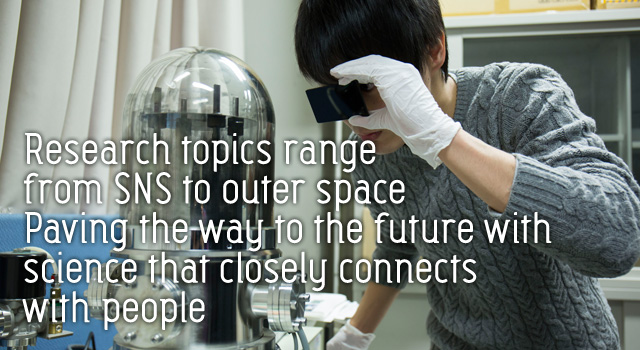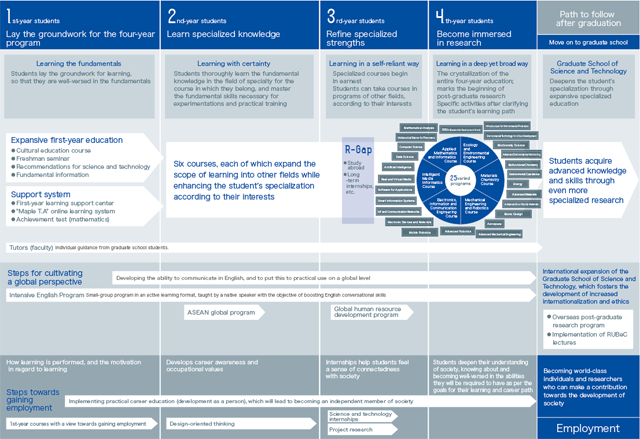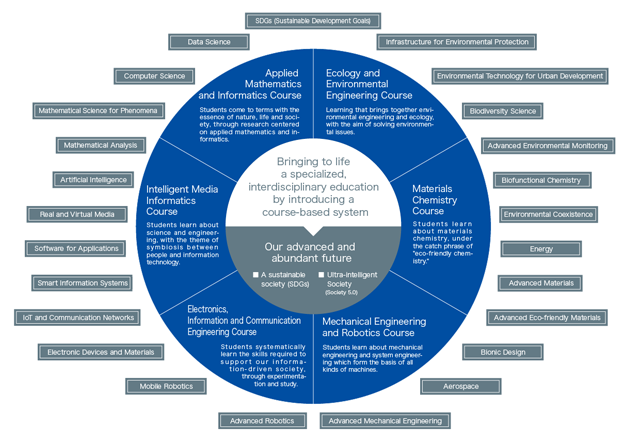Ryukoku University You, Unlimited
Need Help?
Faculties
Faculty of Advanced Science and Technology

Outline
Course
- Applied Mathematics and Informatics Course
- Intelligent Media Informatics Course
- Electronics,Information and Communication Engineering Course
- Mechanical Engineering and Robotics Course
- Materials Chemistry Course
- Ecology and Environmental Engineering Course
Location
Seta Campus
1-5 Yokotani,Seta Oe-cho,Otsu,Shiga 520-2194
Tel077-543-5111 Fax077-543-7729
rikou@ad.ryukoku.ac.jp
Access & Campus Map
https://www.ryukoku.ac.jp/english2/about/access/seta.html
The educational principles and goals of the Faculty of Advanced Science and Technology
Our objective is to foster the development of engineer based on the founding spirit of Ryukoku University, who have a high sense of ethics and who can contribute to the advancements in technology through a wide range of education and research in the sciences and in engineering from the fundamentals to practical applications, with an emphasis on the harmony between science and humanity.
The Four-year Process
We will roll out education with a definite specialization that cultivates a wide field of vision.We will also foster individuals who can contribute to the development of a sustainable society.
Although one of the characteristics of the Faculty of Advanced Science and Technology is that students can flexibly learn in an interdisciplinary way, each course increases in specialization after the student begins their education here. Also, students expand their fields of learning, based on their own interests.

25 varied programs that promote interdisciplinary learning
The "programs" mentioned here consists of courses grouped into packages of around 20 units, all related to a specific topic. For instance, the "IoT and Communication Networks" program is a package that features courses such as "Semiconductor Device Engineering," "Intelligent Robots" and so on.
Students are free to choose courses not only from the fields of specialization they intend to research, but also from the programs that interest them. In this way, we bring to reality an educational system that is interdisciplinary and in which students can learn in a self-reliant way.

R-Gap (Ryukoku Gap Quarter): creating a period for promoting self-reliant activities
In science and technology-related faculties, a cumulative type of education is essential, and it is typical to see required courses established for each student year and semester. While this kind of curriculum allows for education to occur in a progression, this made it difficult for students to get involved in activities that they could only do while enrolled at the university, such as long-term overseas studies or internships. To deal with these issues, the Faculty of Advanced Science and Technology has positioned the second quarter of the third school year as the "R-Gap," a period during which students can undertake self-reliant activities. During this period, the curriculum does not include required courses. Students are free to get involved in any extracurricular activities they choose during a period of three months, which includes summer vacation. Some specific activities include overseas study, internships, project research and research activities, volunteer activities and so on. Of course, students are free to remain at the university during this period and continue with their classes. Our university supports students as they pursue a diverse range of activities at their own pace.
- Examples of major activities undertaken during the R-Gap period
-
- Overseas study
- Long-term internships
- Participate in lectures outside of the program course in one's own field
- Project research (RoboCup project, solar car project), etc.
- Volunteer activities
- Overseas internships
- Participation in various study tours
Step-based programs for cultivating people who will be active on the global scene
We have prepared a unique systematic program for science and technology students who wish to study abroad, in support of their overseas study activities. Through the Faculty of Advanced Science and Technology, students can cultivate the practical skills they need to be active on the front line of creating products; also, they can take a close look at their own learning and career path through our "Global Program," which aims at developing an international point of view and improving their language skills through practical training over the long term, both in Japan and overseas.
1st year: Intensive English Program
This program is aimed at helping students to improve their English abilities and to overcome any feelings of inadequacy towards communicating in English, as well as at cultivating their abilities to give presentations and ask questions in English. This program is targeted at first and second-year Faculty of Advanced Science and Technology students, and is taught by native English-speaking instructors in small groups (the first 20 students to apply only), and is held during with shorter lessons (45 min) at more frequent intervals (five times/week).
2nd year: ASEAN global program
This program features practical training in Vietnam and Singapore during the summer vacation for second-year students. Specifically, students get the opportunity to tour local Japanese companies, participate in PBL (problem-based learning) with Vietnamese students, engage in social gatherings with businesspersons, tour the Nanyang Technological University (Singapore) and so on.
3rd year: Global human resource development program
This is a program where participating students can train in overseas companies, while making use of our university's overseas facilities in California (U.S.A.). The program is aimed at third-year students, and offers internships at Japanese-owned companies in the Silicon Valley area.
Graduate school: RUBeC lectures
These lectures are held to train students how to write essays in English, as well as to learn the language and presentation skills necessary to present at an international conference poster session. The aim is for students to understand the general methods used for project planning at companies within the Silicon Valley, and to express their opinions while comparing these companies with those in Japan.